News
2024

Karniadakis Ranked as Top Author in Applied Mathematics by Stanford/Elsevier Study
George Karniadakis, a Pacific Northwest National Laboratory joint appointee with Brown University and the director of the SEA-CROGS project, was ranked as the top author in the Applied Mathematics field in Stanford University’s 2024 list of “World’s Top 2%” Scientists. The ranking encompasses standardized data on citations, h-index, and a wide range of bibliometric indicators to highlight researchers whose work has had a significant impact across various scientific disciplines. Researchers are classified into 22 scientific fields and 174 sub-fields, drawing from Scopus data provided by Elsevier through ICSR Lab.
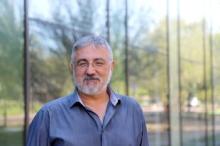
Owhadi Named 2024 Vannevar Bush Faculty Fellow
Houman Owhadi has been named a 2024 Vannevar Bush Faculty Fellow by the U.S. Department of Defense. The Vannevar Bush award nurtures high-risk and innovative ideas that push scientists toward breakthrough discoveries. Owhadi, Caltech, was awarded the honor for his research on "Computational Hypergraph Discovery, a Framework for Connecting the Dots." Owhadi is one of only 11 university scientists and engineers chosen for the 2024 class of Vannevar Bush Fellows
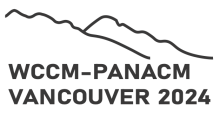
WCCm-panacm minisymposia to be organized by SEA-CROGS researchers
SEA-CROGS researchers are organizing two minisymposiums for the upcoming 16th World Congress on Computational Mechanics and 4th Pan American Congress on Computational Mechanics (WCCM-PANACM), taking place July 21–26, 2024 in Vancouver, Canada. Mauro Perego (Sandia National Laboratories) along with Amanda Howard and Panos Stinis (Pacific Northwest National Laboratory) are organizing the minisymposium "Advances in Neural Operators for Scientific Modeling." Jonas Actor and Elise Walker (Sandia National Laboratories), along with Yue Yu (Lehigh University) are organizing the minisymposium "Causal Discovery and Graphical Causal Models."
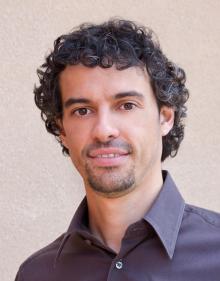
Perego Serves as GlaMacLeS Instructor
Mauro Perego, Sandia National Laboratories, served as an instructor during the Glaciology in Machine Learning Summer School (GLAMACLES), a National Science Foundation-funded project aimed at building foundational skills and a community of practice for early-career researchers at the intersection of machine learning and cryospheric science. GLAMACLES was held June 16–24, 2024 at the Taft-Nicholson Center in southwest Montana.
2023

Karniadakis Named 2023 Highly Cited Researcher
George Karniadakis was named to the 2023 Highly Cited Researchers List by Clarivate Analytics. This list recognizes world-class researchers selected for their exceptional research performance, demonstrated by production of multiple highly cited papers that rank in the top one percent by citations for field and year in Web of Science. Karniadakis, a Pacific Northwest National Laboratory joint appointee with Brown University and the director of the SEA-CROGS project, has published almost 600 articles in refereed journals which have been cited more than 94,300 times, as well as five books.
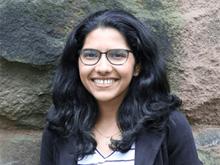
Panda honored with national science foundation career award
Priya Panda was awarded the National Science Foundation's Faculty Early Career Development Program (CAREER) award. Panda, Yale University, was recognized for her research on distributed intelligence with spiking neural networks.
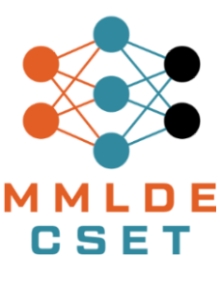
IACM Minisymposium on Physics-Informed Machine Learning Organized by SEA-CROGS Researchers
Amanda Howard and Panos Stinis (Pacific Northwest National Laboratory) along with Nathaniel Trask (Sandia National Laboratories), organized the minisymposium "Physics-Informed Machine Learning for Multiscale Materials and Engineering Systems" at the 2nd IACM Mechanistic Machine Learning and Digital Engineering for Computational Science Engineering and Technology Conference that took place September 24–27, 2023 at the University of Texas at El Paso. Recent work has seen a surge of results in scientific machine learning for multiscale systems by allowing for exploitation of the physical properties of the system. This minisymposium sought to explore the intersection of advanced physics-informed machine learning and its applications for engineering systems. The presenters focused on the latest methods for modeling multiscale systems, including multimodal training of machine learning systems, neural operators, and continual learning.
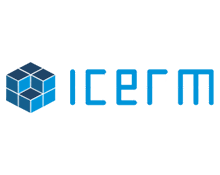
SEA-CROGS Researchers Organized 2023 Mathematical and Scientific Machine Learning Workshop
George Karniadakis (a Pacific Northwest National Laboratory joint appointee with Brown University) served on the organizing committee for the 2023 Mathematical and Scientific Machine Learning (MSML2023) workshop that took place June 5–9, 2023 at Brown University’s Institute for Computational and Experimental Research in Mathematics (ICERM). Presenters at the workshop included SEA-CROGS researchers Amanda Howard (Pacific Northwest National Laboratory), Brad Aimone and Nathaniel Trask (Sandia National Laboratories), Priya Panda (Yale University), Houman Owhadi (California Institute of Technology), and Mengjia Xu (Brown University).

Karniadakis Named One of the Best Mathematics Scientists
The research portal Research.com recently ranked Pacific Northwest National Laboratory (PNNL) joint appointee George Karniadakis as one of the best mathematics scientists in the world. The citation-based metrics rated the Brown University professor as #6 in the United States and #9 in the world.

Karniadakis Named Machine Learning Expert to Follow in 2023
George Karniadakis was named a machine learning expert to follow in 2023 by UK-based data science technology company digiLab. Karniadakis, a Pacific Northwest National Laboratory joint appointee with Brown University and the director of the SEA-CROGS project, was recognized for his recent paper on physics-informed neural networks.

Stinis and Howard to Organize Minisymposium at 2023 Siam Conference on Computational Science and Engineering
Panos Stinis and Amanda Howard (Pacific Northwest National Laboratory), along with Feng Bao (Florida State University) and Guannan Zhang (Oak Ridge National Laboratory), are organizing a mini-symposium on SEA-CROGS related research entitled Machine Learning for Large-Scale Scientific Data Analysis and Model Simulations at the 2023 SIAM Conference on Computational Science and Engineering. The conference takes place February 26–March 6, 2023 in Amsterdam, The Netherlands.
2022
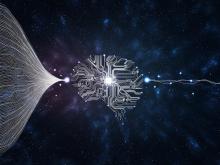
SEA-CROGS Selected for DOE Support
The Scalable, Efficient and Accelerated Causal Reasoning Operators, Graphs and Spikes for Earth and Embedded Systems (SEA-CROGS) project was recently selected for support by the Department of Energy (DOE). Led by Pacific Northwest National Laboratory joint appointee George Karniadakis, SEA-CROGS will focus on physics-informed intelligence for causal reasoning. It is one of four projects selected for DOE support as a Mathematical Multifaceted Integrated Capability Center (MMICC).
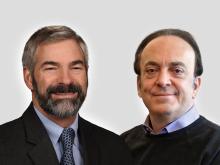
De Yoreo and Karniadakis Elected to the National Academy of Engineering
Jim De Yoreo and George Karniadakis, were elected to the National Academy of Engineering in 2022. Karniadakis, a Pacific Northwest National Laboratory joint appointee with Brown University, is the director of the SEA-CROGS project and previously served as the Director of the Physics-Informed Learning Machines for Multiscale and Multiphysics Problems (PhILMs) project.